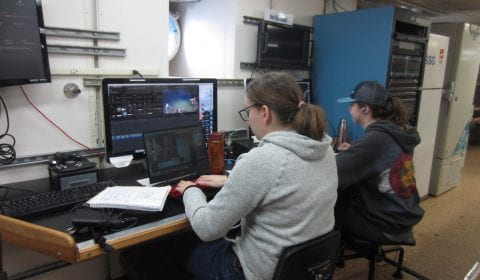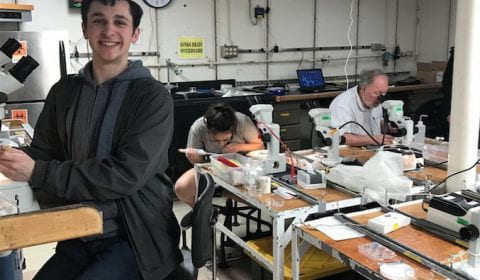


Today is a transit day on the Atlantis to our last site, The Florida Escarpment. Most everyone took advantage of the late start to sleep in, since when Alvin dives we need to wake up at around 7am. While the normal daily processes continue, many of the Western students are working on their personal projects. Though Alvin dives into the deep to collects samples, the processing and investigations happen here all day on the Atlantis.
Dexter and Esmeralda for the past week have been staring through microscopes all day to find larvae. This has led them to be curious about what deep sea mussels prefer to settle on. In order to answer this they are testing to see if they settle more on adult mussel shells, juvenile mussel shells, carbonate rocks, byssal threads, or the plastic of the petri dish. They are doing these experiments in both filtered sea water and the water mussels have been living in to see if mussels release chemicals that influence settling. This will help us better collect larvae samples in the future and understand where mussels are found in the deep-sea. “It’s been really fun looking through microscopes. There’s a bunch of things that you don’t necessarily care about at first, but then you see there’s a lot of fun things you get to see that live in the dark,” reports Esmeralda Farias, senior at WWU.
Hailey Dearing, a second year undergrad at WWU, is interested in possibly carnivorous snails. She will be giving the snail a variety of food including worms, mussels and shrimp to see if the snail shows a preference. There is little information on this snail, including its prey, so she will be contributing largely to the understanding of this organism. Hailey notes, “I’m really grateful to be participating in this sort of research as an undergrad.”
My work on the boat has mainly consisted of looking at videos taken by Alvin at every dive spot, which I feel so lucky to do. I am also a part of the group that takes the organisms out of the Bio-box on Alvin after each dive and put them into chilled seawater. It’s amazing to watch videos of the deep sea and then realize that for every sample we collect, I am the first person to see and hold the organisms in my own hands. After the organisms are collected, they are sorted and the bottom of the biobox is sieved to collect anything we missed. Mussels are shucked, tubeworms are spawned, larvae are identified, and the equipment is modified for the next dive. Additionally, I am working on the animal behavior of snot worms. At the sites where we found them, the worms were in large clumps together, so I will be studying their movement patterns to find each other and how they behave as individuals vs. in groups.
Author’s Highlights:

Glad you had this incredible experience. Can’t wait to hear more. Jo Anne